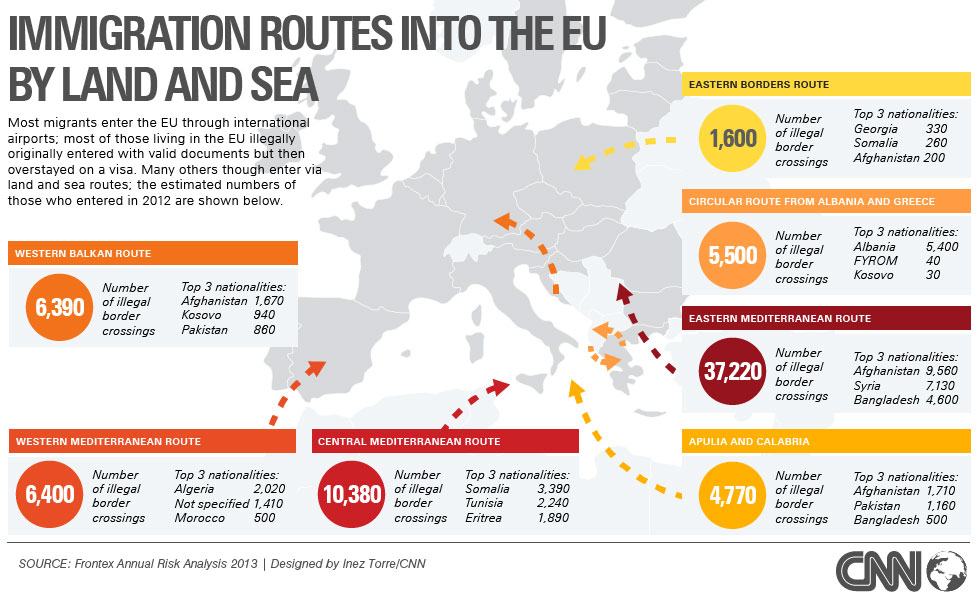The impact of recession that followed the 2008-2009 financial crisis on the immigration policies of Western countries.
The gap between the symbolic and instrumental levels of the immigration policy, i.e. between what officials say in public and their practical steps, is very large. It turns out that the vocalizing of tough immigration policy does not necessarily entail subsequent actions.
It is reasonable to suggest that the recession is likely to result tougher immigration policies. This is basically correct, although reality is somewhat more complicated. First, there is no causal link between the economic situation and migration. The same is true for the volume of migration flows and the actions of authorities to regulate them. There is little doubt that during periods of economic growth, the need for labor inflows is greater than during periods of recession. Nevertheless, certain sectors of the economy are in constant need of migrant labor, regardless of macroeconomic conditions. Thus, the hotel industry in Switzerland is almost 100 per cent dependent on migrant labor; foreign labor accounts for more than two-thirds of those employed in the construction and restaurant industries in many European countries, as well as in the United States and Canada.
Second, the gap between the symbolic and instrumental levels of the immigration policy, i.e. between what officials say in public and their practical steps, is very large. It turns out that the vocalizing of tough immigration policy does not necessarily entail subsequent actions. Moreover, the authorities can carry out activities that demonstrate to society their commitment to combating illegal immigration (for example, through demonstrative deportations), but at the same time, adhere to the laissez-faire policy in relation to external migration.
Third, immigration policy is almost never coherent and consistent. This is primarily due to the fact that decision-makers are objectively caught between economic rationality and political expediency, i.e. between the imperatives of economic efficiency and the need for re-election for another term. In addition, the decision-making process is influenced by various groups whose interests do not coincide. Some businessmen are interested in an influx of cheap labor, while there are many other businessmen (and labor unions) that seek to hinder this influx.
Developments in western countries over recent years illustrate the above three theses perfectly well. To pass for defenders of the national labor market, politicians compete with each other in anti-immigration rhetoric. In doing so, those in opposition take a more hard-line stance than those in power. In the UK, for example, the Labor Party “outdid” conservatives by suggesting, among other things, to deprive migrant workers from other EU countries (a quarter million people from Poland, Romania, Latvia and other Eastern European countries) of welfare payments in the event of job loss. Under current legislation, such migrant workers may request some compensation after three months from the date of dismissal. The Labor Party suggests extending this period to two years. In addition, the Laborites put forward a number of other restrictive initiatives, which their Tory opponents find purely populist and counterproductive. What makes the Laborites do this? The answer is obvious: the chase for votes. (It should be noted that an openly populist UKIP – the UK Independence Party – that is set against immigrants even more, is snapping at their heels in this race).
The situation in the US is very much alike, since President Obama’s Administration is trying to bring into effect decisions that are running into fierce opposition from Republicans. Barack Obama would like to grant partial amnesty to illegal aliens, while his opponents, who recently gained a majority in Congress, promise to block it. In contrast to the situation in UK, there seems to be nothing unusual about this, as the Republicans have traditionally taken a tougher stance on the immigration issue than the Democrats. However, we should bear in mind two things. Firstly, the amnesty, which the Democrats have promoted since coming to the White House in 2008, was prepared in 2004-2005 under George W. Bush, who was a lame duck at that time and could not declare it himself. Secondly, the last immigration amnesty was announced by the Republicans. In 1986, Ronald Reagan allowed several million undocumented immigrants to come out of the shadows amidst fairly tough rhetoric and demonstrative deportations.
Analyzing the concrete steps of Western governments in the area of migration, we cannot but notice the coexistence of two different approaches. The anti-immigration course reflects the growing pressure of populist right-wing parties and accounts for restrictive amendments to the citizenship legislation adopted in many (but not all) European countries. These restrictions include the issues of family reunification, increased minimum time for citizenship applications, the introduction of a language test to gain residence permits for spouses, etc.
On the other hand, a number of West European countries continue to follow the immigration and integration course which they embarked upon before the crisis.
After the crisis of 2008-2009, Sweden, for example, launched a program for recruiting immigrants and actually liberalized its immigration legislation. Of course, in accordance with the latter, Swedish citizens take precedence over immigrants in getting jobs. But at the same time, the new legislation has considerably expanded the powers of employers. New rules stipulate that individual employers rather than officials decide which workers are needed and for how long in certain sectors of the economy (the country suffers from a scarcity of doctors, nurses, electricians, engineers, welders and IT-specialists). In addition, example innovations include extending a labor contract from one to two years with a possibility of a further extension and, most importantly, the right to apply for a permanent residence permits after four years. Finally, the new law allows asylum seekers who have their applications rejected to obtain residence permits if they apply for a work permit within two weeks of the decision being reached.
As you can see, the raison d'etat in regard to immigration is different for different governments.





